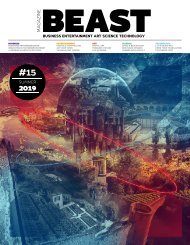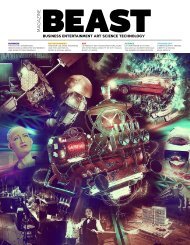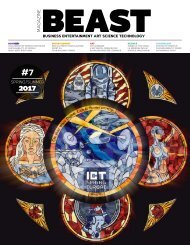Magazine BEAST #16 2019
Create successful ePaper yourself
Turn your PDF publications into a flip-book with our unique Google optimized e-Paper software.
10 #Business | Human Capital<br />
UPSKILLING:<br />
PREPARING THE<br />
WORKFORCE FOR<br />
A DIGITAL FUTURE<br />
BY<br />
ALEXANDRE<br />
KEILMANN<br />
In today’s digital world, our work environment is constantly<br />
evolving, and so are our skills. To understand some of the current<br />
challenges faced by employers but also by employees, <strong>BEAST</strong><br />
met with Christian Scharff (Partner, People & Organisation, PwC<br />
Luxembourg) and Thierry Kremser (Partner, Data & Analytics Leader,<br />
PwC Luxembourg). The HR and data experts tell us more about<br />
upskilling, in a context where talents are more than ever eager to<br />
learn and develop, thanks notably to the use of new technologies.<br />
What does "upskilling" actually consist of? Why has it become<br />
so important for both the company and its employees lately?<br />
Christian Scharff: Our competencies in dealing with jobs are<br />
becoming obsolete faster and faster. This is due to the pace of new<br />
technology introduction but also to the transformation of business<br />
models and working methods. As a consequence, an individual<br />
willing to stay employable has no other choice than to "re-train".<br />
The new word that is currently used is "upskilling" and it is basically<br />
addressed to all the employees who need to remain competitive on<br />
the labour market.<br />
In such a context, people need to equip themselves with new skills<br />
to fully embrace the digital world. It is also important to note that<br />
not all of the new roles are digital-related. What we can observe is<br />
that each transformed – or augmented – job actually requires a mix<br />
of "soft" skills (agility, problem solving, client relationship, etc.), "hard"<br />
skills (new legal or compliance frameworks, new methodologies, new<br />
tools to use, etc.), and "digital" skills (data management, new software,<br />
etc.). In learning programmes, the latter is usually outnumbered by<br />
the first and the second.<br />
How would you convince HR experts to invest in upskilling right<br />
now? How should they communicate this workforce change<br />
to the employees without actually scaring them?<br />
CS: We are living in interesting times. We can see multiple phenomena<br />
happening at the same time: the working population is ageing, birth<br />
rates are on the downturn in developed countries, students are<br />
not choosing STEM disciplines anymore and many of them are not<br />
willing to work for corporates anymore, preferring to be freelancers<br />
instead. We also have a growing percentage of youth (aged 18 to<br />
30) being NEETs (not in Employment, Education or Training). This<br />
means that they are not even preparing for the labour market.<br />
For instance, in Luxembourg, we have merely 7-8% of<br />
NEETs, but it goes up to 18% in France and over 30% in<br />
Turkey!<br />
The combination of all these elements means that<br />
finding new workers will be tougher and tougher: it is<br />
already challenging today and will be even more difficult<br />
in the years to come.<br />
Therefore, we have to consider our current workforce<br />
as a "treasure" that needs to be nurtured. We need to<br />
invest in our people to remain relevant for the future of<br />
work. If done on a regular basis, this effort is perfectly<br />
manageable. Should employers not consider this option,<br />
they might end up with people having insufficient<br />
skills for the new or augmented jobs, and face severe<br />
difficulties to source new talent. Indeed, who would<br />
want to join a company that is not taking care of its<br />
employees’ skills? In the age of social media, employer<br />
branding takes on a greater importance and it has<br />
become key to invest in this area.<br />
On the other hand, this also translates into employers<br />
communicating about future change in a proactive<br />
manner: people will feel involved, with a better<br />
understanding of the business strategy and its<br />
consequent impacts. The current environment also<br />
requires trust to be a constant and the embedded value<br />
when employers communicate with employees about the<br />
need for change. Also, a commitment to upskilling and<br />
a clear statement to accompany workers when going<br />
down this road is key. Sure, it might be challenging in the<br />
beginning, however, first adopters will set the scene for<br />
other employees to engage in an upskilling programme.<br />
<strong>BEAST</strong> MAGAZINE <strong>#16</strong>

















